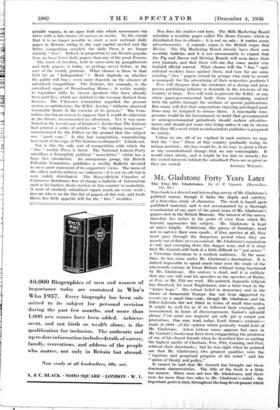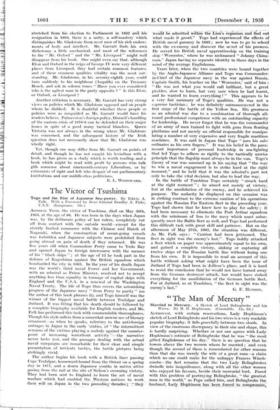Mr. Gladstone Forty Years Later
The Two Mr. Gladstones. By G. T. Garratt. (Macmillan. 12s. 6d.)
Tins book is a shrewd and interesting survey of Mr. Gladstone's political career, though it lacks the depth and subtlety of a first-class study of character. The work is based upon published material, and is not accompanied by a thorough examination of any part of the great mass of Mr. Gladstone's papers now in the British Museum. The interest of the survey therefore lies rather in the point of view from which Mr. Garrett approaches the subject. Mr. Gladstone is kept at arm's length. Politicians, like pieces of furniture, tend not to survive their own epoch ; if they survive at all, they must pass through the dangerous period when they are merely out of date, or even comical. Mr. Gladstone's reputation is only just emerging from this danger zone, and it is clear that Mr. Garrett still finds it a little difficult to " put across " a Victorian statesman to a modem audience. At the same time, he has come under Mr. Gladstone's fascination. It is indeed impossible to spend much time over the study of the nineteenth century in Great Britain without being fascinated by Mr. Gladstone. His oratory is dead, and it is unlikely that any one will read his speeches as the speeches' of Burke, or Fox, or Mr. Pitt are read. His pointed, dogmatic religion has dissolved, for most Englishmen, into a faint trust in the " larger hope." His robust belief in democracy and in the future of democratic Europe has not been supported by events on a small time-scale, though Mr. Gladstone and his fellow-Liberals did not think in terms of small time-scales. It might be well for us if we followed their example, and remembered, in hours of discouragement, Guizot's splendid phrase C'est aussi une majorite que mile qui se ample par generations. One may read, today, Lord Acton's estimate— made in 1880—of the opinion which posterity would hold of Mr. Gladstone. Acton (whose name appears but once in Mr. Garratt's book) may have been exaggerating the greatness of one of his closest friends when he described him as uniting the highest meiits'of Chatham, Fox, Pitt, Canning, and Peel, without their drawbacks ; but he was right when he pointed out that Mr. Gladstona:6 tstro greatest qualities were the, " vigorous and perpetual progress of his mind " and his " union of theory and policy."
It cannot be said that Mr. Garratt has brought out these dominant characteristics. The title of the book is a little too narrow. There were not two Mr. Gladstones, and there were far more than two sides to Mr. Gladstone's mind ; the important point is that, throughout the long development which
stretched from his election to Parliament in 1882 and his resignation in 1894, there is a unity, a self-mastery which distinguishes Mr. Gladstone from most men of his rich endow- ments of body and intellect. Mr. Garrett finds his own dichotomy a little mechanical, and most of the references to the " Mr. Oxford " and the " Mr. Liverpool " might well disappear from his book. One might even say that, although Eton and Oxford in the reign of George IV were very different places from Liverpool, they had 'certain common features, and of these common qualities vitality was the most out- standing. Mr. Gladstone, in his seventy-eighth year, could turn suddenly to his neighbour (Asquith) on the Treasury Bench, and ask in solemn tones " Have you ever considered Who is the ugliest man in the party opposite ? Is this Eton, or Oxford, or Liverpool ?
Another criticism is necessary. Mr. Garrett has very strong views on policies which Mr. Gladstone opposed and on people whom he disliked. It is doubtful whether these people or policies were as misguided as Mr. Garrett would have his readers believe. Palmerston's foreign policy, Disraeli's handling of the eastern crisis of 1876-8 can be defended on their major issues in spite of a good many tactical blunders. Queen Victoria was not always in the wrong where Mr. Gladstone was concerned, and the subsequent history of the Irish question does not necessarily show that Mr. Gladstone was wholly right.
Yet, though one may differ from Mr. Garratt on points of detail, and though he has not caught his leviathan with a hook, he has given us a study which is worth reading, and a book which might be read with profit •by persons who talk glib nonsense about nineteenth-century Liberalism, or by extremists of right and left who despair of our parliamentary institutions and our middle-class politicians.
E. L. WOODWARD.





















































 Previous page
Previous page